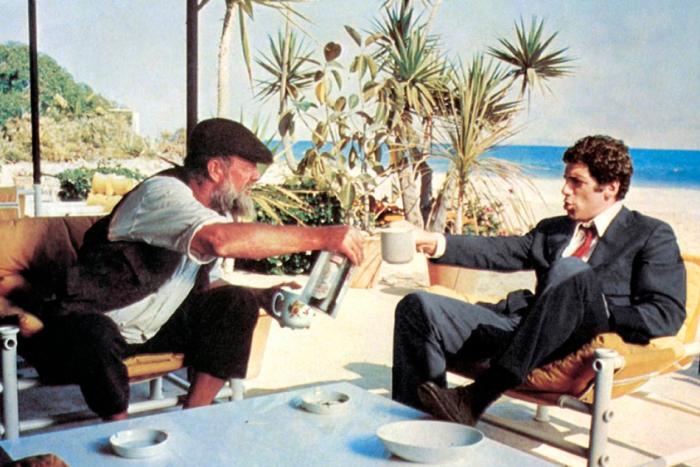Since its premiere in 1995, This American Life has made an entire medium vital again. While it has a small audience compared to more institutional public radio shows (about three million people tune in each week, compared to 12 million for Morning Edition), it has spawned a legion of imitators and, most importantly, introduced a delivery style that has come to define public radio in opposition to its commercial cousins: reporters talking like real people, instead of stentorian news robots.
With the 500th episode airing this weekend, here is a definitive, completely airtight, inarguable list of the 10 most essential episodes and stories:
1. “Medieval Times” from #38, Simulated Worlds
It’s hard to pinpoint when exactly TAL developed its signature tone—some of the earliest episodes, when the show was still called “Your Radio Playhouse,” feel a bit unsure. But the “Medieval Times” segment in 1996 might be where it all coalesced. Glass takes Michael Camille, an actual scholar of the Middle Ages, to the kitschy “dinner-and-tournament”; to everyone’s surprise, Camille finds the depiction emotionally satisfying, if not factually accurate. The crusty academician’s veneer was apparently broken down by jousting.
2. #84 – Harold
An hour-long profile of Chicago’s first and only African-American mayor, Harold Washington, who became unpopular for giving black neighbourhoods equal treatment. When the show re-aired in 2008, it sounded prescient of the racial animus that tainted Barack Obama’s first presidential campaign, right down to the coded language used by John McCain and Hilary Clinton in their attacks.
3. #218 – Act V
Jack Hitt has become an unmissable, though infrequent, contributor to the show, from the story of discovering that his old landlord was actually a mass murderer with diplomatic immunity to his recounting of a disastrous children’s production of Peter Pan. His best is Act V, about prison inmates who stage an evocative version of Hamlet’s final scenes. The episode explores the way art can help with the exorcism of pain and guilt, but also the fundamental dilemma of the American penal system: is the end reformation, or isolation? Whom do we jail, and why?
4. “Is This Thing On?” from #238, Lost in Translation
In which Jonathan Goldstein and Starlee Kine venture to a Chicago bar that has stand-up comedy in their karaoke machine. At first it seems like a story about the gap between intellect and intuition, knowing what’s funny and actually being funny in a performative sense. Slowly, the true game is revealed. Goldstein opens the segment by condescending to Kine, mansplaining the secrets to a good stage delivery. When he bombs, and she enraptures a room reciting a stock routine about man-hating, it becomes a smart commentary on the competitive tensions that undergird friendships between colleagues.
5. #241 – 20 Acts in 60 Minutes
One the best things about TAL is how the show can break format and still feel of a piece with itself. 20 Acts is a show of micro-stories. Some of them don’t work, but there are moments of remarkable levity (two children compromise when naming their dog, coming up with the awkward “Pasta Batman”) and emotional weight (a child prisoner confronts the guards about low quality lunch meat).
Maybe the most shared, most discussed, and most beloved episode from the show’s run so far, in which Starlee Kine writes a breakup song (with some help from Phil Collins) as a form of catharsis. While Kine seems to be having great fun grokking the format of gauzy, melodramatic torch songs, heartbreak still weighs on her. In the final monologue, she imagines a scene in which her ex listens to the ballad she’s written, years in the future, alone in a rocking chair, finally realizing the depth of his mistake.
The morbid history of cryogenics in America, and the hopelessly naïve people who started freezing themselves, believing that reanimation technology would eventually catch up to their ambitions. Unsurprisingly, Errol Morris is adapting this story into a film next year.
8. “The Scorpion and the Tortoise” from #389, Frenemies
David Rakoff’s absence from TAL hasn’t been felt acutely yet, if just because the work he produced before his untimely death last summer is still being parceled out—his first novel finally comes out next week. “The Scorpion and the Tortoise” tells two stories, in verse: a dour man attends his ex-girlfriend’s wedding, and as a toast offers a parable about a reptile too generous with his trust. The punchline is kind of a thesis statement about the way well-meaning people guilelessly welcome trouble into their lives: “We’re creatures of contact. Regardless of whether/ We kiss or we wound, still we must come together.”
9. #454 - The Apple Factory / #460 – Retraction
There’s a hole in the TAL archives: Episode 454, Mr. Daisey and the Apple Factory, is no longer available for download or streaming, and the MP3 has become a collector’s item, a rarity in the digital age. Factory was disowned by the show after producers discovered that Mike Daisey’s harrowing account of conditions at the Apple plant in Shenzhen, China was partly falsified. Their follow-up, Retraction, is even more remarkable—a hour of Daisey trying to justify his work as true to “the rules of theatre”; a deep naval gaze on the nature of journalistic ethics; and, ultimately, a reckoning.
10. #465 - What Happened at Dos Eres
A father and son are reunited—though neither were aware of the other’s existence. The TAL reporters follow Tranquilino Castaneda as he reconnects with a son he had presumed dead following a massacre by the government in Dos Eres, Guatemala. Perhaps it was a fluke in translation, but Tranquilino speaks with surprising poetry about his grief. When asked about his drinking problem: “I thought I could drown my sorrows. But it turns out they could swim.”
Check back next week for more from Chris Berube on This American Life’s 500th episode.






